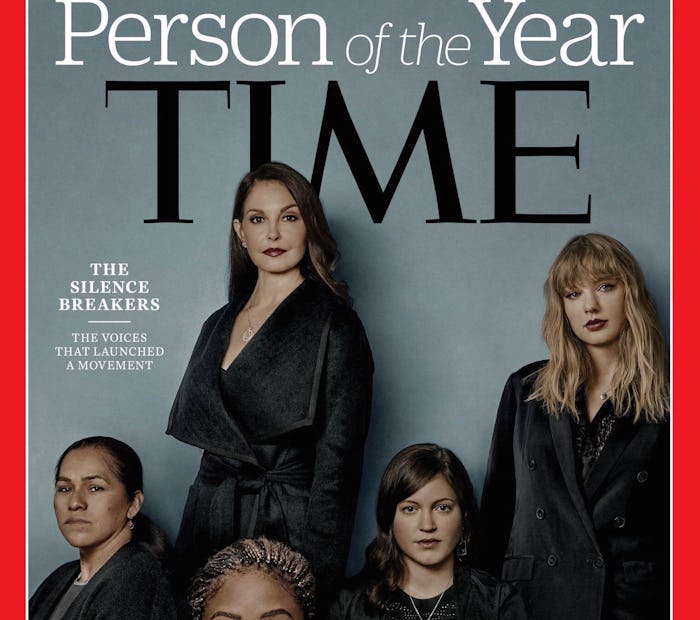News

"The Silence Breakers" Are TIME’s Person Of The Year, & You Need To Know Who They Are
In 2016, President Donald Trump was named TIME's Person of the Year, an accolade given to the person or group who most influenced the news in the past year. This year though, Trump landed at number two on the list — and the group in the top spot proves that a huge shift has taken place for the better over the past twelve months. Who are "The Silence Breakers"? TIME's Person of the Year isn't actually one person, but a collective of individuals at the forefront of the #MeToo movement. Together, they've spoken out and pushed back against widespread sexual harassment, finally bringing the issue into the spotlight where it should have been long ago.
If there's one thing that the #MeToo movement has made abundantly clear this year, it's that nearly every woman has been affected in some way by sexual harassment or assault — as well as the fact that it's also not just women who have been victimized. And while the fight against sexual harassment is nothing new, the fact that victims' voices are actually starting to be heard — and that the individuals responsible are actually starting to face consequences — is monumental.
One of the obvious major turning points took place in October, when prominent actresses like Rose McGowan and Ashley Judd spoke openly and on the record about being sexual harassed or assaulted by Hollywood producer Harvey Weinstein. Yet as much as the controversy was about Weinstein's actions, it was also very clearly about much more than that, and it ignited a much bigger movement that gave women a chance to have their voices heard, and to make it clear that they weren't about to back down.
As the TIME cover story explains though, the Silence Breakers aren't just the celebrities who spoke up, but a group made up of "dozens of people representing at least as many industries" who had mustered the courage to speak up about their own experiences. And together, those individuals ultimately represent all the marginalized people who have tried to do the same.
As a result, TIME's profile includes a variety of people, from well-known public figures to an anonymous hospital worker. In addition to McGowan and Judd, Taylor Swift made the list for her impressive and unapologetic courtroom testimony earlier this year against a radio DJ who was fired after Swift said he groped her. Actress Alyssa Milano also made the list, after her tweet urging people to publicly post their sexual harassment stories using the hashtag #MeToo resulted in millions of responses.
But there were many others, too, like activist Tarana Burke, who actually started the Me Too movement in 2006; Isabel Pascual, a 42-year-old strawberry picker who spoke out at a march in Los Angeles about the prevalence of sexual harassment against women in the agricultural industry; and a group of seven female employees who filed a law suit against the Plaza Hotel in New York City for "normalizing and trivializing sexual assault" in the workplace. And it wasn't just women: actor Terry Crews and director Blaise Godbe Lipman, both of whom have said publicly that they were sexually assaulted by Hollywood agents.
TIME's recognition of the Silence Breakers reinforces what seems to already becoming crystal clear: that we may have finally reached a point where the abuse of male power in the workplace will no longer be tolerated. And it also shows how much has changed in a relatively short period of time. While last year, Trump was patting himself on the back for being chosen as Person of the Year, this year, the collective public outrage following his infamous "grab 'em by the p*ssy" comment (and, well, his election win in general) was highlighted as having helped fuel the Silence Breakers' actions.
What's more is that TIME cover story also discussed the 20 women who have accused Trump of sexual harassment, including former The Apprentice contestant Summer Zervos, who filed a defamation suit against Trump in January after he called her a liar. And while Trump hasn't yet faced repercussions for his alleged actions the way other prominent men like Weinstein, Today show host Matt Lauer, and comedian Louis C.K. have, it is at least hopefully indicative that those women will have their chance to be properly heard, too.
Yet, ahead of the TIME cover story announcement Wednesday, Trump had actually suggested on Twitter that the reason he wasn't Person of the Year this year was not because he wasn't deserving, but because he had turned it down. Claiming that the magazine had told him he would "probably" be given the top spot, the president wrote, "I said probably is no good and took a pass. Thanks anyway!"
TIME refuted Trump's claim though, and said they don't discuss or reveal the Person of the Year pick ahead of time. That rebuttal was likely lost on Trump, but regardless, the magazine's actual choice has definitely made a big impact — not only because it celebrates people who are totally deserving, but because it reflects the strength of a movement that is hopefully only beginning. And given how far #MeToo has come in 2017, it seems that there is a lot to be optimistic about in the year ahead, too.